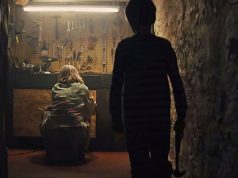
You kids today are spoiled. If you want to watch a dumb movie about women being terrorized by men, you can just turn on the Lifetime Movie Network. But such conveniences did not exist in the ancient times of 1990. In those days, melodramas depicting the disproportionately negative consequences of women’s mildly foolish choices were hard to come by. Audiences clamoring for a story in which, say, a woman gives her phone number to a stranger and then almost gets murdered, or in which a woman answers a personals ad and then almost gets murdered, or in which a woman goes on a blind date and then almost gets murdered had to wait for such a tale to appear on the big screen.
“Lisa” was created to fill this void in the marketplace, and also to alert women to the terrible dangers of the following things: answering machines, being a single mother, and not letting your daughter have a phone in her room. Unfortunately, the movie opened just a few weeks after “Pretty Woman,” and was overshadowed by that film’s more imaginatively fictitious concept of how men and women relate to each other.
The title character of “Lisa” is a 14-year-old Los Angeles girl played by Staci Keanan, who was then at the peak of her fame as the star of TV’s “My Two Dads” (which, by the way, was not even close to being as interesting as the title made it sound). Lisa lives with her mother, Katherine (played by former Charlie’s Angel Cheryl Ladd), who got pregnant as a teenager and is eager to prevent Lisa from making the same mistakes she did, i.e., the mistakes that led to Lisa’s existence. It is a mixed message at best. But Lisa and Katherine have a warm, “Gilmore Girls”-ish relationship, by which I mean they share each other’s clothes, gossip about boys, and cause suicidal thoughts in anyone who gets stuck listening to them jabber.
Like many girls her age, Lisa wants to be an adult and do adult things. She would like to have sex with attractive men, for example. That is one of the grown-up things she wants to do. She doesn’t come out and say the word “sex,” but she definitely wants to have older boyfriends. She and her BFF Wendy (Tanya Fenmore) like to snap Polaroids of handsome strangers they see on the street and keep the pictures in a scrapbook hidden under Lisa’s bed. Sometimes they’ll note a man’s license-plate number, call the DMV, sweet-talk his home address out of whoever answers, and then lurk outside his house giggling. Now that I think about it, it’s entirely possible that this is what 14-year-old girls think “sex” is. At any rate, the film helps us develop an appreciation for how much harder it was to stalk people before the Internet.
While Lisa is engaging in this weird, unproductive, unhealthy but mostly harmless behavior, Los Angeles is being menaced by a murderer (played by D.W. Moffett). Dubbed the Candlelight Killer, his modus operandi is to rape and murder women in their homes. Not very original, I know. But he also has a gimmick where he leaves a message on the woman’s answering machine first, then breaks into her house and waits so that he can be there when she gets home and listens to it. The message always says, “Hello, this is Richard. I’m in your apartment. I’m going to kill you.” I have to admit, I would probably be creeped out if I heard that message, especially if it was followed by Richard killing me. The only thing more unsettling than being murdered is being told that you’re going to be murdered right before you are murdered.
The stories of Richard the serial killer and Lisa the girl who wants to grow up too fast intersect when they literally bump into each other on the sidewalk one night. Lisa doesn’t know that the man is a murderer, of course, only that he is twice her age and handsome. She dutifully spies on him until he gets in his car, takes down his license number, and works her DMV magic. Next thing you know she’s calling him at home, pretending to be some “mystery woman” he met once, and having long, flirtatious phone conversations. Richard is intrigued, probably by the idea of there being a beautiful woman out there whom he has met but failed to murder.
You might be wondering where Lisa thinks this phone relationship is going to lead. If she ever meets up with Richard in person, he will see that she is a teenage girl and lose interest in her, both romantically and professionally. (He kills women, thank you very much, not children.) Lisa’s friend Wendy raises the same question, and Lisa says, hey, you never know, maybe he will love me even though I am 14! Maybe we will run off together in a romantic fashion! Many teenage girls think this way — foolish, impractical, immature — but kudos to Lisa for doing it in a way that seems especially crazy. For such a smart girl, she sure is dumb.
Katherine won’t let Lisa go on dates until she’s 16 — a reasonable and prudent rule, especially considering that if she knew the extent of Lisa’s man-stalking behavior, she would probably raise it to 30. But she also lets Lisa wear her clothes and perfume, and tell waiters that they are sisters rather than mother and daughter, all of which seems like asking for trouble. The best part is that while Katherine is currently dating a decent, wholesome man, she hides it from Lisa out of fear that if Lisa knows her mom is gettin’ some, she’ll go out and get some herself. Katherine has not even tried to explain to Lisa the concept of certain things being OK for adults but not teenagers.
Ironically, Katherine’s brilliant strategy of hiding her completely normal romantic relationship from her daughter has the opposite effect. Lisa thinks the reason her mom is so strict with her is that she’s lonely herself. Ergo, if Lisa could find a man for Katherine, Katherine would loosen up and let Lisa do whatever she wants. Somehow this leads to Lisa setting up a rendezvous with Richard in such a way that Richard will meet Katherine and think that SHE is Lisa. Five seconds of conversation will clear that up, of course, but Lisa figures Richard and Katherine will have fallen in love by then, and Katherine will allow Lisa to start dating, and Richard will be her new father, or possibly boyfriend that she shares with her mother. Lisa may not have considered all the specifics of her scheme.
This is where the movie finally gets to the point and has Richard attempt his “murder foretold by answering machine” trick on Katherine. We paid to see Katherine and Lisa cower in a corner while a psychopath hunts them, and at last the goods are being delivered! They can’t call the police, either, because Katherine got angry with Lisa for something earlier and took the phone out of her bedroom, and Lisa’s bedroom happens to be where they are now cowering. That means it’s up to the ladies to defend themselves from Richard, which they do by beating him with a baseball bat and pushing him out the third-story window. He deserves it, obviously — but would it have hurt to record a creepy message first telling him they were going to do it? Small gestures really do count for a lot.
There are several lessons to be learned from this dreary, mawkish story, some of them contradictory. If Katherine had let Lisa date at 14, she wouldn’t have sought out more dangerous pastimes. If Katherine hadn’t taken the phone out of Lisa’s room, they could have called the police. On the other hand, if Lisa hadn’t disobeyed her mother and hadn’t generally been a weird liar who tells weird lies, none of this would have happened. On the third hand, Katherine’s reason for not telling Lisa she had a boyfriend is insane. But on yet a fourth hand, she was probably right that Lisa would throw a fit if she knew. That’s too many hands for one movie, and all of them should be used to slap some sense into everybody involved.
— Film.com





